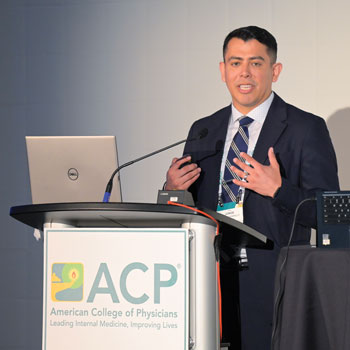
How to remove an allergy label
An expert offers guidance on why and how physicians can “delabel” patients of allergies to penicillin and other medications.
So many Americans incorrectly believe they have a penicillin allergy that there is actually a day, September 28, set aside to recognize this problem, John Kelso, MD, told Internal Medicine Meeting 2025 attendees.
“About 10% of patients are labeled as being allergic to penicillin, but only about 5% of those who are labeled as being allergic are currently allergic to penicillin,” he said. “So the vast majority of patients whose medical record says they're allergic to penicillin are not allergic to penicillin.”
Dr. Kelso, a professor of adult and pediatric allergy and immunology at Scripps Clinic in San Diego, offered guidance on why and how physicians can “delabel” patients of allergies to penicillin and other medications.
“It's not OK to be mislabeled as being allergic,” even if there is another medication that could be prescribed, he said. “The something else often doesn't work as well. It's suboptimal treatment. They have more side effects, particularly things like [Clostridioides difficile], cost more, and they promote antibiotic resistance.”
There are several ways that patients may have come to be mislabeled, Dr. Kelso explained. “When a patient tells you they're allergic to a medication, usually what they're describing is they were taking a medicine and some bad thing happened,” he said.
That could be an allergy, a problem unrelated to the medication (a rash due to illness, for example), or a side effect that isn't an allergy. “Patients taking oral antibiotics have nausea. That's a side effect, not an allergy,” said Dr. Kelso. Patients may also have truly had an allergy in childhood that later disappeared.
Differentiating these issues starts with taking a thorough history of the allergy. “There's certain questions we need to ask: How long ago did this thing happen that made you think you were allergic to the medicine? What particular medication were you taking? How long had you been taking the medication before the bad thing happened? What was the nature of the reaction? Had you taken the medicine previously?” said Dr. Kelso.
The answer to the first question may negate the rest, he noted. “A lot of patients say, ‘I don't know. I was a kid.’” But if a patient can come up with any details about the timing and nature of a reaction, that can be very useful.
“If they happen to remember that it was after the first dose of medication in a new course, that would be consistent with an IgE-mediated reaction,” he said. “On the other hand, if they can clearly remember that they had been taking the medication for several days before the rash occurred, you've just excluded an IgE-mediated mechanism.”
To have an IgE-mediated reaction, a patient will also have had a prior exposure to the drug, he noted. And although an IgE-type reaction is the most common kind of allergy to worry about, it is not the only one.
“You can have an immunologically mediated thing that happens later. Some of those are dangerous. … late-onset rashes that people can get that are serious, meaning you can die,” Dr. Kelso said.
These severe cutaneous adverse reactions, known by the acronym SCAR, include Stevens-Johnson syndrome/toxic epidermal necrolysis, drug reaction with eosinophilia and systemic symptoms, and acute generalized exanthematous pustulosis.
Patients' descriptions should allow you to differentiate these dangerous conditions from a typical drug rash, he explained. “How ugly was the rash? Was there peeling of your skin? Did you have sores in your nose or mouth or eyes or genitals? Were you ill from the reaction itself? Did you have a high fever? Did you have to seek medical care?”
Skin testing won't identify these delayed non-IgE reactions, he noted. “We have to go completely based on the patient's history of what happened to decide whether or not we think it was causal, and whether or not we're going to tell the patient it's OK to take the medication again or not,” said Dr. Kelso. “For those SCAR reactions, that's an absolute contraindication.”
For patients who had a more normal rash, the presence of any other symptoms is important to know. “Ask them if they felt bad in any other way that might sound like anaphylaxis: Were they short of breath? Were they lightheaded? Most people will say, ‘No, I just had hives,’” he said.
The next question on Dr. Kelso's list might not be so intuitive. “This sounds silly. … But it is worth asking, ‘Have you had this medicine since this event occurred?’” This is particularly applicable to penicillin allergies, since a person can't be allergic to just one drug in the class, he said.
Dr. Kelso offered an example of how this conversation goes: “‘Doctor, I'm allergic to penicillin.’ ‘Oh, so you haven't taken any kind of penicillin since then, like amoxicillin or Augmentin?’ ‘Oh no, I had Augmentin last month for a sinus infection. I took a whole week of it. I was fine.’ Well, there you go, they're not allergic.”
This allergy history-taking is not as time-consuming as you might think, he added. “It sounds like that would be like a 20-minute interview, but it's usually a two-minute or one-minute interview, because they'll say, ‘It was a long time ago’ or ‘My mother told me I was allergic’ or ‘I don't remember the details.’”
If, however, there are enough details to determine that the patient did not have a SCAR, immediate-onset hives, or symptoms of anaphylaxis, you can move on to delabeling the patient yourself. (Those whose history supports an IgE-mediated reaction should see an allergist for skin testing, Dr. Kelso noted.)
For a reported penicillin allergy, “delabeling—all that means is we give the patient a dose of amoxicillin, and we watch them for an hour. If they don't get itchy, they're not allergic. That's it,” said Dr. Kelso.
Patient communication is an important component of this process. “We tell the patient the truth, which is, the overwhelming odds are that when they take the amoxicillin capsule, nothing is going to happen. This is going to be completely uneventful,” he said. “If it is a reaction, it would probably just be hives, and we could give them some antihistamine.”
In the unlikely event that the patient has a more serious reaction, the health care team would be prepared to treat that, too. “It's also important to have the nurses reinforce those truths, to tell the patient this is almost certainly going to be uneventful,” he said. “All we do is give them the amoxicillin and tell them, ‘If you feel itchy or bad in some way, let me know.’”
Then walk away and do not hover, he advised. “You don't need to stand at the bedside saying, ‘Are you itchy? Are you feeling OK?’ Because then the patient's going to start being itchy.”
If, after an hour, a patient hasn't had a reaction, they aren't allergic. “The chance of having either an immediate or a delayed reaction to that amoxicillin, if you screen the patients the way we described, is less than 5%,” said Dr. Kelso. “You will have a few patients who, sure enough, get a couple of hives within that hour of observation.”
For those patients, provide an antihistamine and keep their allergy label. For those with no reaction, the allergy can come off their chart. “Take it off right then and put a little note in there that says they passed an amoxicillin challenge on such and such a date,” Dr. Kelso said. “Tell the patient … that there is a small chance that the next day they would get some kind of little rash, and if so, take a picture and let you know. Then you can put the allergy back on their chart if you need to, but you can describe the nature and timing of what happened.”
If a patient does later develop a drug rash that is definitely not anaphylaxis or a SCAR, that's not an absolute contraindication to taking the offending medication now or in the future, he noted. “You can consider treating through,” Dr. Kelso said. “Maybe they should just go ahead and finish their course of medication and you'll treat the rash.”
As always, it's a matter of balancing the benefits and risks of the medication, he explained. “You might consider saying, ‘Well, I know you got that drug rash last time. It may or may not happen again, but you really need this medicine.’”



